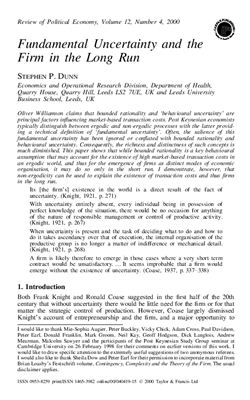Статья. Опубликована в Review of Political Economy, Volume 12,
Number 4, 2000
Oliver Williamson claims that bounded rationality and ‘behavioural uncertainty’ are
principal factors in uencing market-based transaction costs. Post Keynesian economists
typically distinguish between ergodic and non-ergodic processes with the latter providing
a technical de nition of ‘fundamental uncertainty’. Often, the salience of this
fundamental uncertainty has been ignored or con ated with bounded rationality and
behavioural uncertainty. Consequently, the richness and distinctness of such concepts is
much diminished. This paper shows that while bounded rationality is a key behavioural
assumption that may account for the existence of high market-based transaction costs in
an ergodic world, and thus for the emergence of rms as distinct modes of economic
organisation, it may do so only in the short run. I demonstrate, however, that
non-ergodicity can be used to explain the existence of transaction costs and thus rms
in the long run.
Oliver Williamson claims that bounded rationality and ‘behavioural uncertainty’ are
principal factors in uencing market-based transaction costs. Post Keynesian economists
typically distinguish between ergodic and non-ergodic processes with the latter providing
a technical de nition of ‘fundamental uncertainty’. Often, the salience of this
fundamental uncertainty has been ignored or con ated with bounded rationality and
behavioural uncertainty. Consequently, the richness and distinctness of such concepts is
much diminished. This paper shows that while bounded rationality is a key behavioural
assumption that may account for the existence of high market-based transaction costs in
an ergodic world, and thus for the emergence of rms as distinct modes of economic
organisation, it may do so only in the short run. I demonstrate, however, that
non-ergodicity can be used to explain the existence of transaction costs and thus rms
in the long run.

